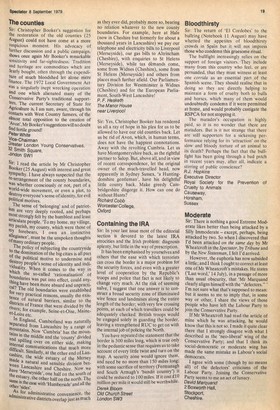The counties
Sir: Christopher Booker's suggestion for the restoration of the old counties (25 August) could not have come at a more auspicious moment. His advocacy of further discussion and a public campaign, shows once again Mr Booker's remarkable sensitivity and far-sightedness. Tradition and heritage are commodities which are dearly bought, often through the expenditure of much bloodshed let alone mere finance. The 1972 Local Government Act was a singularly inept wrecking operation and one which alienated many of the Conservative Party's traditional supportters. The current Secretary of State for Agriculture is, I am sure, aware, through his contacts with West Country farmers, of the almost total opposition to the creation of 'Avon', Mr Booker's suggestions will no doubt find fertile ground! Peter White Vice-Chairman areater London Young Conservatives, 32 Smith Square, -ondon SW1 Sir: I read the article by Mr Christopher Booker (25 August) with interest and great sympathy. I have always suspected that the re-arrangement of the county boundaries, was whether consciously or not, part of a world-wide movement, or even a plot, to destroy everyone's sense of identity, for evil Political motives. The sense of 'belonging' and of patriotism are very deeply rooted, and perhaps most strongly felt by the humblest and least articulate people. To my home, my village, my Parish, my county, which were those of my forebears, I own an instinctive allegiance', must be the unspoken thoughts of many ordinary people. The policy of subjecting the countryside to the domination of the big cities is all part Of the political motive to undermine and destroy people's sense of identity and individuality. When it comes to the way in Which the so-called 'rationalisation' of boundaries was put into effect, could anything have been more absurd and unpractical? The old boundaries were established for very practical reasons, usually the existence of natural barriers, similar to the districts of France that were divided by the rivers; for example, Seine-et-Oise, Maineet-Loire etc. In England, Cumberland was naturally separated from Lancashire by a range of mountains. Now 'Cumbria' has the mountains in the middle and the 'county' divided and spilling over on either side, making internal communications that much more difficult. Similarly, at the other end of Lancashire, the wide estuary of the Mersey made a natural and sensible division between Lancashire and Cheshire. Now we have 'Merseyside', one half on the south of the estuary, the other half on the north. The same is the case with 'Humberside' Other 'sides'. and all the As for administrative convenience, the administrative districts overlap just as much as they ever did, probably more so, bearing no relation whatever to the new county boundaries. For example, here at Hale (now in Cheshire but formerly for about a thousand years in Lancashire) we pay our telephone and electricity bills to Liverpool (Merseyside), our gas bills to Altrincham (Cheshire), with enquiries to St Helens (Merseyside), while tax demands come, some from Widnes (Cheshire), some from St Helens (Merseyside) and others from places much further afield. Our Parliamentary Division for Westminster is Widnes (Cheshire) and for the European Parliament, South-West Lancashire!
P. F. Hesketh The Manor House near Liverpool Sir: Yes, Christopher Booker has rendered us all a ray of hope in his plea for us to be allowed to have our old counties back. Let us be rid of Avon, which, in human terms, does not have the happiest connotations. Away with the revolting Cumbria. Let us have Montgomeryshire back, as the rightful partner to Salop. But, above all, and in view of recent correspondence, let the original owner of the much-travelled head, now apparently in Sydney Sussex, 'a Huntingdonshire gentleman', have his delightful little county back. Make greedy Cambridgeshire disgorge it. How can one do without Hunts?
Richard Cobb Worcester College, Oxford


































 Previous page
Previous page